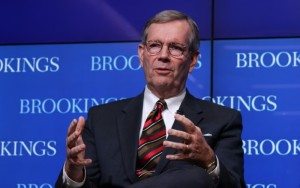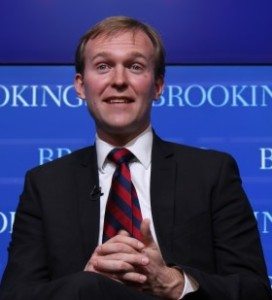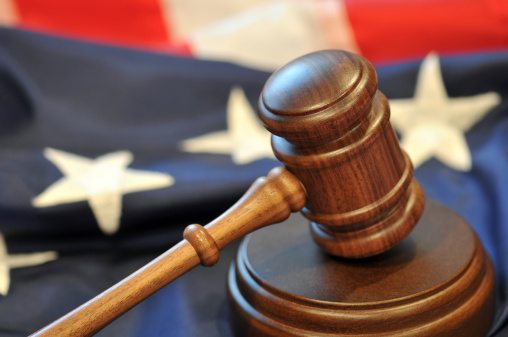WASHINGTON – There’s been a lot of pain for members of the Church of Jesus Christ of Latter-day Saints and the lesbian, gay, bisexual and transgender community in Utah, Salt Lake County Mayor Ben McAdams said.
McAdams said he hopes two bills that recently passed by the Utah Legislature can help ease that pain.
The bills would ban discrimination in employment and housing and allow some government clerks to refuse to perform same-sex marriages.
McAdams and religious and human rights advocates recently debated the effects of the new bills at the Brookings Institution.
The first bill prohibits discrimination in employment and housing based on sexual orientation and gender identity. It passed the Senate on a 23-5 vote and the House on a 65-10 vote. Utah Gov. Gary Herbert recently signed it into law.
Known as the “Utah compromise” among state legislators and leaders of the Mormon church, the bill had been in the works for seven years, Clifford Rosky, law professor at the University of Utah, said.
The law received massive support from Utahns after it was endorsed by the Mormon church.
According to the latest Gallup poll, six in 10 Utahns identify with the Mormon church.

Former Utah Gov. Michael Leavitt tells an audience at the Brookings Institution on Monday that the two new pieces of nondiscrimination legislation in Utah are models for the nation. (SHFWire Photo courtesy of Jordan Gass-Pooré)
“Jesus wouldn’t condone the mistreatment of others, so no community should do that either,” former Utah Gov. Michael Leavitt, a Mormon, said to explain why the church supported this law.
The Mormon church released a statement Thursday applauding the legislature’s efforts.
“While other states may find a different solution, we hope this fair, balanced approach shows that fairness for all is possible,” the statement said.
Members of the Mormon church and LGBT people may not be treated equally but are “very much intertwined,” McAdams said.
The Mormon church has not always been as accepting of LGBT rights.
“I think both organizations recognize that continuing a war would have casualties on both sides,” McAdams, a Mormon, said.
The new law exempts church-affiliated organizations and the Boy Scouts of America because they are not considered employers.

Salt Lake County Mayor Ben McAdams says the passage of two monumental pieces of nondiscrimination legislation will help heal old wounds between members of the Church of Jesus Christ of Latter-Day Saints and lesbian, gay, bisexual and transgender people in Utah. (SHFWire Photo courtesy Jordan Gass-Pooré)
It doesn’t address whether denying services, such as flowers or wedding cakes based on religious beliefs is considered discriminatory, and it doesn’t regulate public accommodations. Rosky said both sides are working to pass public accommodations laws this year that would protect LGBT people.
Utah is one of 19 states and the District of Columbia that has this kind of legislation, according to the Movement Advancement Project.
Three states have employment and housing nondiscrimination laws that cover sexual orientation but not gender identity. Federal law prohibits discrimination against transgender people.
The Mormon church also gave its blessing to the second bill, although some LGBT advocacy groups were less enthusiastic.
The bill, which cleared the House on Wednesday on a 66-9 vote, allows employees in government clerk’s offices to decline to perform same-sex marriages because of religious objections. The bill does not apply to the clerk’s office itself, and someone in the office would have to marry a same-sex couple.
Leavitt said the Mormon church’s decision to support the bills has not, and will not, change its position on marriage – that, as stated in the Book of Mormon, marriage is between a man and a woman.
Robin Fretwell Wilson, University of Illinois law professor, said this bill is essential to the “Utah compromise” by allowing Utahns to preserve the uniquely religious character of marriage.
Utah legalized same-sex marriage in October after the Supreme Court declined to review a case from Utah and four other states.
“Other LGBT rights can’t be pushed forward if the religious right doesn’t have this allowance,” she said.
Sarah Warbelow, legal director for the Human Rights Campaign, an LGBT advocacy group, said the bills provide much needed protection but aren’t enough. Problems will continue to arise until LGBT people are granted equal rights under the law.
An indirect consequence of the legislation, she said, is that it provides a path forward for LGBT youth growing up in Mormon homes with parents who have struggled to accept them.
“We know that when youth are rejected from their families, regardless of their family’s background, they have higher rates of attempts of suicide, suicide ideation, abuse of drugs and alcohol, school dropout rates, and so this is going to have a dramatically positive impact on the LGBT youth of Utah,” Warbelow said.
(This story was originally featured on Scripps Howard Foundation Wire)








